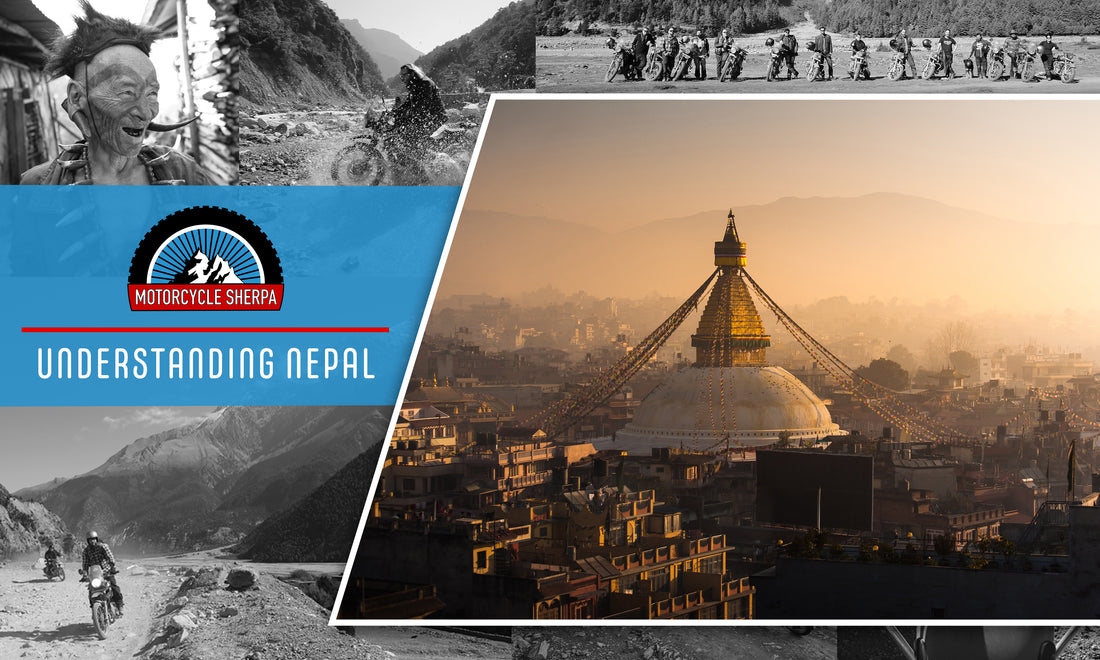
Understanding Nepal
Share
Nepal is a beautiful, landlocked country full of mountains, sandwiched between Tibet and India. Most people think of the Himalayas and Mount Everest, but the people and culture are equally vibrant.
Religion
Many religions are practiced in Nepal, including Buddhism, Hinduism, Christianity, Islam, Sikhism, Jainism, animism, ancestor worship, and Bon. However, the main two religions are Buddhism and Hinduism.
Thanks to the patient, calm nature of the Nepalese people, it’s possible for all these religions to coexist peacefully, as they’ve done for centuries.

Buddhism
Buddha is the center of worship, and there are five Dhyani Buddhas: Amoghasiddhi, Rathasambhava, Vairochana, Amitabha, and Akshobhaya. Each one represents a different element and has great importance. Some Hindus worship Buddha as well.
Hinduism
The Nepalis who practice Hinduism worship the Vedic gods, including Shiva, Vishnu, and Bramha (known as the Supreme Hindu Trinity).

Festivals
The two largest festivals in Nepal are Tihar and Dashain, both religious celebrations.
Dashain: This 15-day-long celebration commemorates when the gods were victorious over a demon. It occurs annually from late September to early October. The first nine days are about the battle, the tenth day about the demon being slain, and the final five days a happy celebration over the victory.
Tihar: Also called the Festival of Lights, Nepalis hang oil lamps around their villages and in their homes. The celebration, which centers around the Hindu goddess Laxmi, lasts for five days and occurs after Dashain.

Customs
A different set of ethnic beliefs and customs can be found across the country, thanks to the varied geography. Many of the customs that exist today have their roots in religious traditions.
One consistent custom is that Nepalis don’t eat beef, mainly because those who practice Hinduism believe the cow is sacred. The cow is also Nepal’s national animal.
Nepal has strong roots as a patriarchal society, meaning men usually work and head the household while women stay home and raise children. The roles can be reversed in the city, which has some trends towards more modern values.

Marriage
Nepal has some unique views on marriage, the main one being that the parents should arrange a match once the boy and girl come of age.
Pure and Impure
Nepalis divide some things as being either pure or impure. For example, food or other items that have been touched by someone else’s mouth, directly or indirectly, is impure. Cow dung, on the other hand, is pure (at least for cleansing purposes).
Food
Despite a distinctive culture, there is no one cooking style in Nepal as food habits often vary based on region. Tibetan and Indian cooking styles have influenced the foods.
One consistency is that Nepalis eat with their right hands rather than using silverware. Some dishes often associated with Nepal are boiled rice (bhat), lentil soup (dal), and curried vegetables (tarkari).
Curried meat is another popular dish, but it’s typically reserved for special occasions as it’s expensive.

Qualities of the Nepalese People
Nepalis are well known for being calm, patient, and tolerant. They are also very loyal, to both their culture and their citizenship. Nepalis take great pride in never having been colonized, and they hold the land in high regard.
Social Hierarchies
There is a large stratification between the powerful and the poor in Nepal, which is viewed as simply part of the natural order. Those who are rich, landowners, or older tend to have the highest reputations.
It can be difficult to ascertain a person’s background and status from a glance, so Nepalis frequently ask a lot of questions (about education, age, their family, and their profession) to determine how much respect is due.

The Caste System
While most commonly associated with the Hindu caste system in India, castes play a part in Nepalese culture. There are four main categories:
- Vaishyas
- Brahmins (the purest)
- Sudras (the lowest class)
- Kshatriyas
A person’s caste plays a huge role in his life, from which jobs he can have to who he can marry to how much respect he is owed by others.
Collectivism
Nepali culture places a high value on collectivism. Families will share assets to make sure everyone is secure, and friends often do favors for each other. An individual’s survival often depends on the survival of the community, so everyone pitches in to make sure everyone is cared for.

Friendship
Friendships are very significant to the Nepalese people. They are not treated lightly, and making a new friend is considered a great honor.
Nepalis love to do tasks with a friend or family member, preferring companionship to solitude. They also love to talk, holding conversations simply to enjoy the act of talking.
